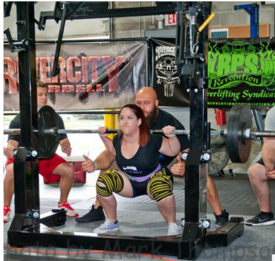This may be a silly question about weighing food

sargessexyone
Posts: 494 Member
So I have recently started to weigh my food instead of just measuring and I am quite curious about something. I will use mayo as my reference since that is what led me to the question in the first place.
The label says a serving size is 1 tbsp (14g). Calories for one serving is 35. Now I know from reading a lot of posts that I should weigh out the 14g to get an accurate calorie count so that is what I did. Surprise surprise 14g is NOT 1 tbsp. And that my dear friends is what brings me to my question.
How do we know which measurement they are actually using when they calculate the calories? Am I the only one who has thought of this? I'm really just curious so if anyone has an answer I would really appreciate it.
Thanks in advance.
The label says a serving size is 1 tbsp (14g). Calories for one serving is 35. Now I know from reading a lot of posts that I should weigh out the 14g to get an accurate calorie count so that is what I did. Surprise surprise 14g is NOT 1 tbsp. And that my dear friends is what brings me to my question.
How do we know which measurement they are actually using when they calculate the calories? Am I the only one who has thought of this? I'm really just curious so if anyone has an answer I would really appreciate it.
Thanks in advance.
0
Replies
-
bump! I'm curious as well...0
-
Bump. Good question...0
-
Volume measurements (tbsp, cup, etc.) are more approximate due to settling that occurs in the shipping/moving process. Weight Watchers stresses weighing food rather than using measurements. I'd say you're pretty safe to assume the weight was used to calculate the nutritional values, because it is a more accurate and predictable measurement.0
-
Use the weight, 100%, no question. Especially for high calorie foods like fats, nuts, oils, mayo.0
-
How much is 14g then? Less than a teaspoon?0
-
I suspect the bottle itself is measure in oz or grams correct? not cups or tbsp...hence the serving size in grams being accurate...0
-
I believe they use the weight measurement, which is why everyone will say to always weigh your food. Volume is subjective...how tightly are you packing that one cup? But weight is not subjective, and so that is used to do calorie counts.0
-
Bump. My guess is grams (because grams don't lie), but have no evidence right now to back that up.0
-
What kind of tbsp do you mean? Do you mean one that is actually a spoon? if so was it heaped? if not are you talking about the measuring types of spoon where you level it flat? I find the latter are much smaller than an actual spoon (although wouldn't use one to weigh out mayo cos it would all stick inside it!)0
-
Mass > Volume0
-
It's an approximation. Also, maybe the weighing tools they use are more accurate than yours.0
-
They use grams when measuring for nutritional information. The tablespoons, cups, etc. are approximate and there for our convenience.
I know, I was shocked at how much more mayo you get when measuring grams vs. tablespoons. 13g is closer to two leveled tablespoons!0 -
Weight.
If you look at the amount of servings there are in anything, and measure out each serving by weight, it'll be dead on or remarkably close to reality.
If you measured it out by volume, you'll come up short somewhere along the way.0 -
Volume measurements (tbsp, cup, etc.) are more approximate due to settling that occurs in the shipping/moving process. Weight Watchers stresses weighing food rather than using measurements. I'd say you're pretty safe to assume the weight was used to calculate the nutritional values, because it is a more accurate and predictable measurement.
I understand that the weight of the whole jar could shift a little due to shipping and whatever but that would only affect the weight of the entire jar. I could stand there and shake the jar to shift the weight but when I open a jar of mayo, a tbsp is a tbsp and 14g is 14g. However a tbsp is not 14g. Of mayo anyway 0
0 -
Weigh in grams, that what I been saying for awhile "don't measure", weigh everything like peanut butter, they say is 2 tbsp but it's not!!0
-
I am finding that I use less condiments with weighing - not that this really answers you question
I find that weighing makes me more aware of the amounts I use rather than just using a normal spoon and throwing ingredients together - I used to "eye ball" everything when I cooked - it's a little more time consuming but it helps in the end0 -
What Mayo are you using that's 35 calories?0
-
I believe they use the weight measurement, which is why everyone will say to always weigh your food. Volume is subjective...how tightly are you packing that one cup? But weight is not subjective, and so that is used to do calorie counts.
Now THIS is the answer that makes the most sense.0 -
What Mayo are you using that's 35 calories?
Hellmanns light0 -
I would definitely go with weighing vs. measuring. But that is interesting to know that serving is not equal to the weight!0
-
a proper tablespoon measure, levelled off, should be 15 ml and as oil is less dense than water would weigh just under 15g.0
-
Volume measurements (tbsp, cup, etc.) are more approximate due to settling that occurs in the shipping/moving process. Weight Watchers stresses weighing food rather than using measurements. I'd say you're pretty safe to assume the weight was used to calculate the nutritional values, because it is a more accurate and predictable measurement.
I understand that the weight of the whole jar could shift a little due to shipping and whatever but that would only affect the weight of the entire jar. I could stand there and shake the jar to shift the weight but when I open a jar of mayo, a tbsp is a tbsp and 14g is 14g. However a tbsp is not 14g. Of mayo anyway
This is where you're wrong. The *weight* of the jar does not change during shipping.
Take something like corn flakes cereal. If a manufacturer weighs 500g into a box, seals it, and ships it, then when it gets to you *it will still be 500g*. HOWEVER, it may have been crushed or condensed during shipping, resulting in more cornflakes per measuring cup. (This is equivalent to the person who said something about how tightly you pack a cup.)
As an experiment:
Take 1 cup of whole corn flakes. Now crush them. You'll get somewhere around 1/2 cup crushed, depending how tiny you crush them haha.
Take the same cup of whole corn flakes and *weigh* it - somewhere around 28g. Now crush the cornflakes and weigh them again. Surprise! They still weigh 28g.0 -
a tbsp is a tbsp and 14g is 14g. However a tbsp is not 14g. Of mayo anyway

At a guess, I'd say surface tension and viscosity at different temperatures, air pressure, elevation, etc. accounts for the variety in volume. But that's just a guess.0 -
Actually a tablespoon is not a tablespoon, and even in a viscous substance like mayo you can have compacting which will impact the measure.
Consider this, I am making a product that I need to give you a liquid measure for. Now I have calculated out the product so that the right serving size to get the calorie number I want you to use to be 2.1 teaspoons or 14g if you use weight. Now there aren't a lot of people out there who are going to have a tenth of a teaspoon measure and probably fewer who want to measure out my product that way even if they did. Also it is inconvenient to measure it out as 2.5 teaspoons each time so I label it as 1 tablespoon or 14g by weight. That would mean that if you did it by tablespoons for this particular product you would get almost 5 grams more than you were supposed to. Now the reality of what you are dealing with is probably he difference between 2.5 and 3.5 teaspoons somewhere and would be a much smaller percentage, but this would not be a-typical of how a measure would be labeled on a package.
Always use weight because it tends to be more accurate, but even there you are left at the accuracy of the package. You don't typically see things labeled in partial grams and very few scales could measure it anyway.0 -
Always use the weight. That's why people don't lose weight... they don't realize that the measurements are wrong 99% of the time.
Grams are fool proof... they'll always be grams. A tablespoon will vary from one person to another, from one brand to another, from one food to another...0 -
What Mayo are you using that's 35 calories?
I'm not the OP, but the Kraft mayo made with olive oil is 35 calories per tbsp (15g).0 -
In one of the other recent weighing threads someone mentioned she'd bought some fancy, decorative measuring spoons that were almost twice the size of her regular spoons. Not even all tbsps are created equal.0
-
I know, I was shocked at how much more mayo you get when measuring grams vs. tablespoons. 13g is closer to two leveled tablespoons!
Maybe I need a new scale. My 14g was less than 1 tbsp LOL. And yes I did remember to zero out the container.0 -
Interesting discussion. Thanks for posting.0
-
How much is 14g then? Less than a teaspoon?
I just weighed a level tablespoon of full fat mayo and it clocked at 13.9 grams, although it's not a calibrated laboratory scale :-
better log it now ;-)0
This discussion has been closed.
Categories
- All Categories
- 1.4M Health, Wellness and Goals
- 398.1K Introduce Yourself
- 44.7K Getting Started
- 261K Health and Weight Loss
- 176.4K Food and Nutrition
- 47.7K Recipes
- 233K Fitness and Exercise
- 462 Sleep, Mindfulness and Overall Wellness
- 6.5K Goal: Maintaining Weight
- 8.7K Goal: Gaining Weight and Body Building
- 153.5K Motivation and Support
- 8.4K Challenges
- 1.4K Debate Club
- 96.5K Chit-Chat
- 2.6K Fun and Games
- 4.8K MyFitnessPal Information
- 18 News and Announcements
- 21 MyFitnessPal Academy
- 1.5K Feature Suggestions and Ideas
- 3.2K MyFitnessPal Tech Support Questions



















